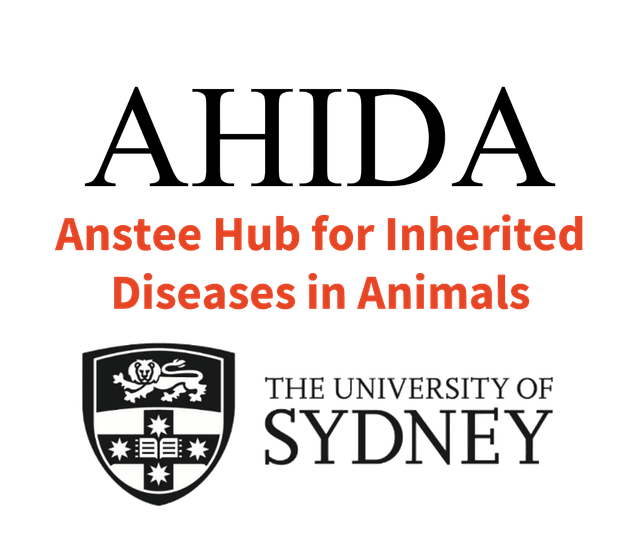Research from the AHIDA project
AHIDA supports research student projects at the University of Sydney:
2021
Project title: Livestock inherited diseases
Research students: Katie Eager; Emmy Payton; Leah Johnson
Supervisors: Imke Tammen & Brendon O'Rourke
2023
Project title: A Genetic Investigation of Ventricular Septal Defects in Arabian Horses
Research student: Caitlin Brown
Supervisors: Brandon Velie & Natasha Hamilton
Project title: Molecular characterisation of cerebellar ataxia in Bazedaise cattle
Research student: Xing Gao
Supervisors: Imke Tammen & Brendon O'Rourke
Project title: Cryptorchidism in the Australian Racing Greyhound
Research student: Kate Mylan
Supervisors: Claire Wade & Hamutal Mazrier
Project title: Investigation of Burmese cats with primary glaucoma
Research student: Holly Dawson
Supervisors: Bianca Waud & William Irving
Project title: Characterising canine and feline opioid receptor variants to identify novel genetic basis for anaesthetic risk
Research student: Tamara Graham
Supervisors: Sanaa Zaki, Claire Wade & Bianca Waud
2024
Project title: Molecular characterisation of dermatosparaxis in Merino sheep and congenital dyserythropoietic anaemia with dyskeratosis and progressive alopecia in Poll Hereford cattle
Research student: Katie Eager
Supervisors: Imke Tammen, Brendon O’Rourke, Cali Willet
Project title: Investigating xanthinuria in cats: An emerging veterinary challenge
Research student: Michelle Kim
Supervisors: Bianca Waud, Brandon Velie, Natalie Courtman, Emily Pritchard, Chris Simpson
AHIDA supports enhancements to Online Mendelian Inheritance in Animals (OMIA)
Online Mendelian Inheritance in Animals (OMIA, (https://omia.org) is a freely available curated knowledgebase that contains information and facilitates research on inherited traits and diseases in animals. For the past 27 years, OMIA has been used by animal geneticists, breeders, and veterinarians worldwide as a definitive source of information. OMIA is modelled on and reciprocally hyperlinked to Online Mendelian Inheritance in Man (OMIM, https://www.omim.org), and provides further links to PubMed and Gene records at the National Center for Biotechnology Information and the European Bioinformatics Institute’s Ensembl) and to the Mondo disease ontology (https://mondo.monarchinitiative.org/). As a key resource for AHIDA, OMIA has been allocated some funding from the AHIDA bequest for software engineering support from the Sydney Informatics Hub and Imke Tammen has joined Frank Nicholas as OMIA curator. The increase in curation capacity and SIH software engineering support have resulted in software upgrades and commencement of several new initiatives, with a focus to expand the integration of OMIA into other resources and databases via the use of ontologies.
AHIDA supports collaborative efforts to create the Vertebrate Breed Ontology (VBO)
Since the early planning for AHIDA it became clear that a standardised nomenclature for breeds would be a key resource. Frank Nicholas started discussions to develop a vertebrate breed ontology with Melissa Haendel (Anschutz Medical Campus of the University of Colorado), Chris Mungall (Environmental Genomics and Systems Biology Division, Lawrence Berkeley National Laboratory), Peter Robinson (The Jackson Laboratory for Genomic Medicine), and Zhiliang Hu and Jim Reecy (Department of Animal Science, Iowa State University). An international collaborative team was established largely from within the Monarch Initiative (https://monarchinitiative.org/), led by Melissa Haendel. Other members comprised Chris Mungall, Nicole Vasilevsky (TISLab), Zhiliang Hu, Jim Reecy (joined by Cari Park, also from the Department of Animal Science, Iowa State University), Gregoire Leroy and Roswitha Baumung (Domestic Animal Diversity Information System (DADIS), FAO, Rome), and Nico Matentzoglu (Semanticly, Athens, Greece). University of Sydney members of the team were Frank Nicholas, Imke Tammen and (from the Sydney Informatics Hub) Marius Mather, resourced via AHIDA funding. Sabrino Toro (TISLab) joined the team in June 2021. The first version of VBO (incorporating around 8,800 breed names (with known synonyms) across 37 livestock species, as compiled by FAO from information provided by a national breed coordinator from each of 182 countries) was released on the Monarch Initiative GitHub website (https://github.com/monarch-initiative/vertebrate-breed-ontology) on 6 May 2022. By that time, Melissa Haendel had generously resourced a postdoctoral position to work with Sabrina on the VBO, enabling Katie Mullen to join the TISLab team in Colorado in May 2022. Halie Rando also joined the team. The first version of VBO was accepted into the OBO Foundry (https://obofoundry.org/ontology/vbo.html) on 5 September 2022. A second version of VBO, incorporating cat breeds gleaned primarily by Katie from major international and national resources, was released on GitHub and OBO Foundry on 22 September 2022, and the next day was also released on two Ontology Lookup Services (OLS): https://www.ebi.ac.uk/ols/ontologies/vbo and https://ontobee.org/ontology/vbo. The OLS release was particularly important because it is the resource from which OMIA and AHIDA interrogate the VBO. Importantly, VBO is freely accessible from either OLS for use by any organisation or resource that wishes to use it.
